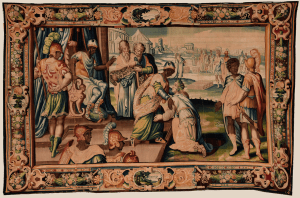MONDAY, April 15th, Sarah Kunjummen, “Blackness in Circulation: George Herbert’s ‘Aethiopissa’ in 17th-Century Context”

Protected: Materials for Hutson Workshop
WEDNESDAY, March 20th, Lorna Hutson, “How England Became an Island: The Faerie Queene”

Renaissance Workshop Spring 2024 Schedule
Dear Colleagues,
We hope you are all having a wonderful break after the Winter. We know many of you are taking this time to rest and recover as much as possible for the Spring Quarter, but because The Renaissance Workshop has two events to announce for Week One of Spring, we wanted to get some dates on your calendar sooner rather than later.
We are happy to announce the Renaissance Workshop’s Spring 2024 schedule, which can be found in full below. The workshop meets on Mondays from 5:00-6:30pm in Rosenwald 405 unless otherwise specified. Should you like to join a meeting via Zoom, please email either Alyssa Mulé (amule@uchicago.edu) or Andrés Irigoyen (airigoyen@uchicago.edu) for accommodation. In the event that the meeting switches to a virtual setting, we will notify you in the announcement a week in advance of the event.
Materials for the workshop, as well as the schedule and any updates, are available on our website. The Renaissance Workshop is free and open to the public, and we encourage those new to the workshop to attend.
We look forward to seeing you on TUESDAY, March 19th when we collaborate with the Medieval Workshop in hosting Jenny Tan (Acquisitions Editor in Medieval, Renaissance, and Early Modern Studies) for a Workshop and Q&A on Publication! The location is TBA for this event.
Please also note, the very next day (WEDNESDAY, March 20th), we are excited to announce that Lorna Hutson, Merton Professor of English at Oxford University and author of Circumstantial Shakespeare, will be presenting a chapter from her most recent book, England’s Insular Imagining: The Elizabethan Erasure of Scotland. The chapter is titled “How England Became an Island.” This event is in Rosenwald 405, and you will not want to miss it!
Best,
Andrés and Alyssa
Spring 2024
TUESDAY, March 19th | Jenny Tan
Acquisitions Editor in Medieval, Renaissance, and Early Modern Studies
Publication Workshop and Q&A (Location TBA)
This event is co-sponsored by the Medieval Workshop
WEDNESDAY, March 20th | Lorna Hutson
Merton Professor of English Literature
University of Oxford
“How England Became an Island” from England’s Insular Imagining: The Elizabethan Erasure of Scotland
This event is co-sponsored by the Nicholson Center for British Studies
Monday, April 15th | Sarah Kunjummen
Assistant Instructional Professor, Master of the Arts Program in the Humanities
University of Chicago, Department of English
“Blackness in Circulation: George Herbert’s ‘Aethiopissa’ in 17th-Century Context”
Monday, April 29th | Zoom Event!
Adam Zucker (co-editor at ELR) and Joe Campana (editor at SEL for 12 Years)
Journal Submission and Writing Workshop and Q&A Zoom Event
Monday, May 13th | Alyssa Mulé
PhD Candidate, University of Chicago
Title TBD
Protected: Materials for Yu Workshop
TUESDAY, March 5th, Esther Sin-Ching Yu, “On the Novel as Practice: The Conscience-Consciousness Nexus and A Journal of the Plague Year (1722)”

Protected: Materials for Lesley Workshop
MONDAY, February 5th, Sarah-Gray Lesley, “Behn and Pulter’s Transatlantic Fictions: Writing White Femininity after 1650”

Please join the Renaissance Workshop
MONDAY, February 5th, when
Sarah-Gray Lesley
PhD Candidate, University of Chicago
presents the paper
“Pulter and Behn’s Global Fictions: Writing White Womanhood after 1650”
MONDAY, February 5th
5:00-6:30pm
Cobb Hall 430
*please note the different room*
The paper, to be read in advance, has been distributed to the Renaissance Workshop mailing list and is available on our website under the password “whitefemininity.” Light refreshments will be served.
If you would like to join our mailing list, please click here. We are committed to making our workshop accessible to all persons. Questions, requests, and concerns should be directed to Andrés Irigoyen (airigoyen@uchicago.edu) or Alyssa Mulé (amule@uchicago.edu).
